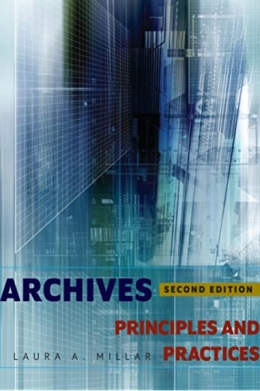
Archives, Second Edition: Principles and Practices
Customers outside of North America (USA and Canada) should contact Facet Publishing for purchasing information.
Primary tabs
You don't need to be an ALA Member to purchase from the ALA Store, but you'll be asked to create an online account/profile during the checkout to proceed. This Web Account is for both Members and non-Members.
If you are Tax-Exempt, please verify that your account is currently set up as exempt before placing your order, as our new fulfillment center will need current documentation. Learn how to verify here.
- Description
- Table of Contents
- About the author
- Reviews
Written in clear language with lively examples, the book outlines fundamental archival principles and practices, introduces core concepts, and explains best practices to ensure that documentary materials are cared for as effectively as possible. This revised edition contains expanded discussion of the impact of digital technologies on archival materials and archival practice and an examination of the changing role of the archivist in the digital age, as archival professionals find that they need to be directly engaged with the creators of records in order to help ensure the preservation of valuable archives, for the present and for posterity. Topics addressed in the book include:
- the nature of archives and archival institutions;
- the role of archival service as a matter of trust;
- core archival concepts such as provenance, original order and respect des fonds;
- practical guidance in the execution of central archival tasks, including appraisal, preservation, arrangement, description, reference and access; and
- discussion about the changing role and responsibilities of the archival institution and archival practitioner, as digital technologies fundamentally transform how records and archives are created, captured, preserved, used and shared.
Figures and tables
Acknowledgements
Introduction
PART I: Principles
1. What are archives?
2. An overview of archival theories and concepts
3. The nature of archives
4. The uses of archives
5. Types of archival institution
6. Archival service as a public trust
7. Balancing access and privacy
PART 2: Practices
8. Establishing the archival institution
9. Appraising and acquiring archives
10. Preserving archives
11. Arranging and describing archives
12. Making archives available
13. Providing online access and reference
Conclusion
To learn more
Journal literature
National and state institutions
Professional associations
Additional reading
Glossary of terms
Index
Laura A. Millar
Dr. Laura A. Millar is an independent consultant and scholar in records, archives, and information management and has also worked in publishing and distance education. She has consulted with governments, universities, colleges, professional associations, non-profit organizations, and other agencies around the world. Her work has ranged from advising the Government of Hong Kong on best practices in records and archives management to consulting with First Nations’ communities in the Canadian arctic on the preservation of indigenous sources of evidence. She was named the winner of the Society of American Archivists' 2011 Waldo Gifford Leland Award for Archives: Principles and Practices. She is the author of dozens of publications and conference presentations, and she has taught records and archives management in several universities in Canada and internationally. She lives with her husband in the community of Roberts Creek, on the Sunshine Coast of British Columbia, Canada.
"An engaging primer for practicing archivists and students of the field ... Millar ably tackles topics such as the concept, nature, history, acquisition, preservation, and future of archives. Including a helpful list of resources for further reading and a glossary of archive-related terms, this is a well-rounded book."
— Booklist


